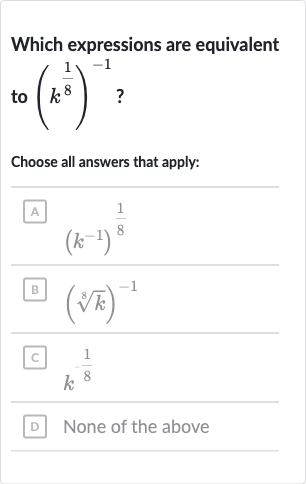Full solution
Q. Which expressions are equivalent to ?Choose all answers that apply:A B C D None of the above
- Understand properties of exponents: Understand the properties of exponents. When raising a power to another power, you multiply the exponents. So, should be simplified by multiplying the exponents and .
- Apply exponent multiplication rule: Apply the exponent multiplication rule.
- Compare with given options: Compare the result with the given options.Option A: is not equivalent because it suggests taking the reciprocal of first and then the th root, which is not the same as .Option B: is equivalent because taking the th root of and then taking the reciprocal is the same as raising to the power of .Option C: is exactly what we found in Step , so it is equivalent.Option D: "None of the above" is not correct because we have found equivalent expressions in the options provided.
More problems from Identify equivalent linear expressions I
QuestionGet tutor help

